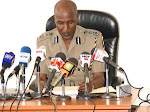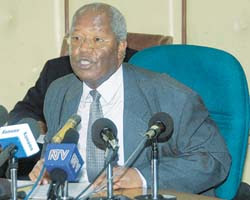 As Kenya splits along ethnic lines and the body count spirals, desperate residents say they are turning to once-hated gangs for protection.
As Kenya splits along ethnic lines and the body count spirals, desperate residents say they are turning to once-hated gangs for protection.
Politicians are using gang members as militias. One gang recruiter in Nairobi said she receives about 30 calls daily from people seeking membership, and politicians including a government minister are offering money for weapons to fuel the furor over the presidential election.At a camp for displaced families in Nairobi's Mathare slum, she led the crowd in a Kikuyu song before asking those whose homes were burned or looted whether they would consider joining the Mungiki gang.
"If we are many, we can go and chase those people," she explained, the ragged crowd staring at her designer sunglasses and gold high heels delicately poised above the mud. "This is the time to join us." Hands shot up around the circle. The Mungiki began as a quasi-religious group dedicated to promoting Kikuyu culture in the 1980s and flourished during Kikuyu leader Uhuru Kenyatta's failed presidential bid in 2002. The Taliban and other ethnic militias, like the Sungu-Sungu and the Chinkororo, emerged in response, members say.
The state-funded Kenya National Commission on Human Rights says strong "circumstantial evidence" links the police to more than 450 execution-style murders of young men last year during a crackdown on the Mungiki.
"Mungiki is the unofficial arm of the government. They are the ones who are being brought here because the government wants it to appear as if it was a civilian thing. So the police provide the cover." The Mungiki recruiter interviewed by The Associated Press spoke on condition of anonymity for fear of police or gang reprisals. Several members said rich businessmen were offering about $15 a day to protect their property. Politicians offered cash to buy guns, the gang members said.
"They (the politicians) are coming to search for us so we can fight," said a male Mungiki member. Fake Mungiki gangs were being set up, he complained, to get the politicians' money. That echoed allegations from human rights and other groups that politicians were organizing the postelection violence, citing the long history of orchestrated political violence in Kenya."Police demand money to protect you, but Mungiki just want you to join."Gang membership comes with a price. As part of the initiation, the Mungiki demand that female members undergo ritual genital cutting.
A Mungiki woman in charge of the ritual in part of Mathare slum said she was cutting around five girls a week since the violence started; the whole of last year she cut fewer than 50. Sometimes girls had second thoughts, so she locked them in her house to prevent them from escaping, she said. Once initiated, it is difficult for men and women to leave the gang alive. Mungiki recruiters say they will kill anyone who tries to leave for fear they will betray gang secrets.
There are no reliable estimates on the number of gang members. Many Mungiki say they are not yet willing to fight for the government, because the gang is still nursing a grudge over last year's police crackdown. But they say they are loath to turn away new members and money for guns. Some say they have received word the gang will really begin its "work" in February. The Mungiki recruiter said the gang is stockpiling supplies, including food and weapons, for the coming battle.















|